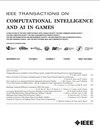Calculating Ultrastrong and Extended Solutions for Nine Men’s Morris, Morabaraba, and Lasker Morris
Q2 Computer Science
IEEE Transactions on Computational Intelligence and AI in Games
Pub Date : 2016-09-01
DOI:10.1109/TCIAIG.2015.2420191
引用次数: 8
Abstract
The strong solutions of Nine Men's Morris and its variant, Lasker Morris, are well-known results (the starting positions are draws). We reexamined both of these games, and calculated extended strong solutions for them. By this, we mean the game-theoretic values of all possible game states that could be reached from certain starting positions where the number of stones to be placed by the players is different from the standard rules. These were also calculated for a previously unsolved third variant, Morabaraba, with interesting results: most of the starting positions where the players can place an equal number of stones (including the standard starting position) are wins for the first player (as opposed to the above games, where these are usually draws). We also developed a multivalued retrograde analysis, and used it as a basis for an algorithm for solving these games ultra-strongly. This means that when our program is playing against a fallible opponent, it has a greater chance of achieving a better result than the game-theoretic value, compared to randomly selecting between “just strongly” optimal moves. Previous attempts on ultrastrong solutions used local heuristics or learning during games, but we incorporated our algorithm into the retrograde analysis.计算九个男子莫里斯,Morabaraba和Lasker莫里斯的超强和扩展解
九人莫里斯及其变体拉斯克莫里斯的强大解决方案是众所周知的结果(起跑位置是平局)。我们重新检查了这两个游戏,并为它们计算了扩展的强解。这里,我们指的是所有可能的博弈状态的博弈论值,即从玩家放置的石头数量不同于标准规则的特定起始位置可以达到的所有可能的博弈状态。我们还计算了之前未解决的第三种变体Morabaraba,并得出了有趣的结果:大多数玩家可以放置相同数量的石头的起始位置(包括标准起始位置)都是第一个玩家获胜(与上述游戏相反,这些游戏通常是平局)。我们还开发了多值逆行分析,并将其作为解决这些游戏的算法的基础。这意味着当我们的程序与一个容易犯错的对手比赛时,与随机选择“强”最优移动相比,它有更大的机会获得比博弈论值更好的结果。之前对超强解决方案的尝试使用了局部启发式或游戏期间的学习,但我们将我们的算法整合到逆行分析中。
本文章由计算机程序翻译,如有差异,请以英文原文为准。
求助全文
约1分钟内获得全文
求助全文
来源期刊

IEEE Transactions on Computational Intelligence and AI in Games
COMPUTER SCIENCE, ARTIFICIAL INTELLIGENCE-COMPUTER SCIENCE, SOFTWARE ENGINEERING
CiteScore
4.60
自引率
0.00%
发文量
0
审稿时长
>12 weeks
期刊介绍:
Cessation. The IEEE Transactions on Computational Intelligence and AI in Games (T-CIAIG) publishes archival journal quality original papers in computational intelligence and related areas in artificial intelligence applied to games, including but not limited to videogames, mathematical games, human–computer interactions in games, and games involving physical objects. Emphasis is placed on the use of these methods to improve performance in and understanding of the dynamics of games, as well as gaining insight into the properties of the methods as applied to games. It also includes using games as a platform for building intelligent embedded agents for the real world. Papers connecting games to all areas of computational intelligence and traditional AI are considered.
 求助内容:
求助内容: 应助结果提醒方式:
应助结果提醒方式:


